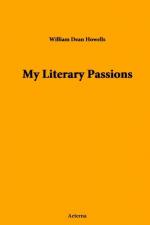I do not know why I was so long in reaching Tennyson, and I can only account for it by the fact that I was always reading rather the earlier than the later English poetry. To be sure I had passed through what I may call a paroxysm of Alexander Smith, a poet deeply unknown to the present generation, but then acclaimed immortal by all the critics, and put with Shakespeare, who must be a good deal astonished from time to time in his Elysian quiet by the companionship thrust upon him. I read this now dead-and-gone immortal with an ecstasy unspeakable; I raved of him by day, and dreamed of him by night; I got great lengths of his “Life-Drama” by heart; and I can still repeat several gorgeous passages from it; I would almost have been willing to take the life of the sole critic who had the sense to laugh at him, and who made his wicked fun in Graham’s Magazine, an extinct periodical of the old extinct Philadelphian species. I cannot tell how I came out of this craze, but neither could any of the critics who led me into it, I dare say. The reading world is very susceptible of such-lunacies, and all that can be said is that at a given time it was time for criticism to go mad over a poet who was neither better nor worse than many another third-rate poet apotheosized before and since. What was good in Smith was the reflected fire of the poets who had a vital heat in them; and it was by mere chance that I bathed myself in his second-hand effulgence. I already knew pretty well the origin of the Tennysonian line in English poetry; Wordsworth, and Keats, and Shelley; and I did not come to Tennyson’s worship a sudden convert, but my devotion to him was none the less complete and exclusive. Like every other great poet he somehow expressed the feelings of his day, and I suppose that at the time he wrote “Maud” he said more fully what the whole English-speaking race were then dimly longing to utter than any English poet who has lived.
One need not question the greatness of Browning in owning the fact that the two poets of his day who preeminently voiced their generation were Tennyson and Longfellow; though Browning, like Emerson, is possibly now more modern than either. However, I had then nothing to do with Tennyson’s comparative claim on my adoration; there was for the time no parallel for him in the whole range of literary divinities that I had bowed the knee to. For that while, the temple was not only emptied of all the other idols, but I had a richly flattering illusion of being his only worshipper. When I came to the sense of this error, it was with the belief that at least no one else had ever appreciated him so fully, stood so close to him in that holy of holies where he wrought his miracles.




